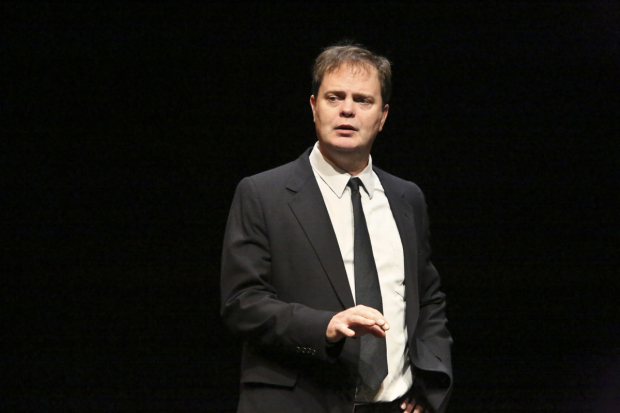Thom Pain (based on nothing)

(© Michael Lamont)
Thom Pain is antagonistic toward his audience. He shouts at them, starts tangents that he suddenly drops, draws seemingly interminable pauses, and rambles on about stories that lead nowhere. This Pulitzer Prize finalist, written by Will Eno, will invigorate or infuriate one depending on their perspective but it is doubtful audiences have seen anything resembling this monologue before.
Possibly named for Thomas Paine, the American Revolutionary author of Common Sense, the protagonist of this solo show dispenses his own brand of logic to an unsuspecting audience. He interjects his opinion of the world while revealing the painful experience of a young boy who lost his dog in a violent accident, being attacked by bees, and meeting a girl who would later devastate him. Though he never divulges that he is the boy in those stories, he certainly does imply it. In between these stories, he tells "jokes" that are intentionally unfunny, pulls audience members onto the stage only to abandon them (or have these audience members merely been planted beforehand) and plays with the audience's minds.
Thom Pain lives up to his name. The man is in agony and wants those around him to empathize and suffer too. The humor evolves out of the discomfort he evokes with these mind games. The coy asides are deliberately incoherent, yet the stories are vivid. The audience feels the sting of the bees, the electric current searing through the beloved pet, and the cruelty of love. Writer Eno knows when to confound his audience and when to confront them.
Under the direction of Oliver Butler, Rainn Wilson interprets the title character as one depressed with his life's direction. He lures audiences into his web by mocking their expectations. He promises magic and raffle wins only to stamp out those ploys. His silences leave the audience abandoned, which makes them beg for his words even more. In a sense, the audience is both his coconspirator and his victim.
In the end, Eno's play is a Rorschach test, one that never clarifies the point after 80 minutes. Audiences may find their own interpretation in what has spilled out or simply dismiss the entire evening as the work of a self-indulgent playwright. Thom Pain is probably a bit of both, a perplexing evening about the universality of discomfort and isolation, as well as completely obtuse.











